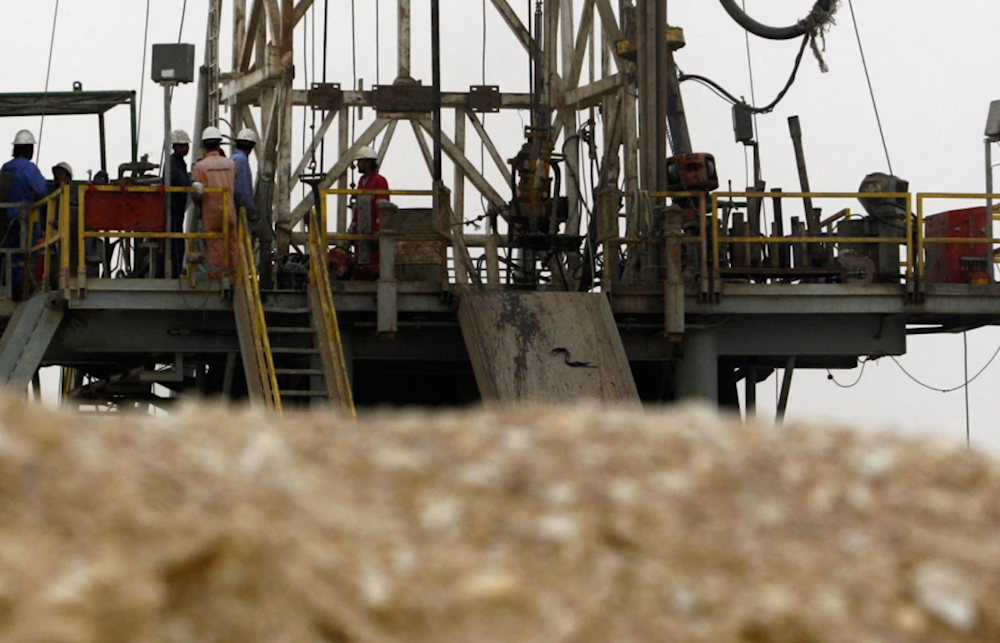Eight OPEC+ members extend voluntary oil supply cuts
Their voluntary supply cutbacks of 2.2 million barrels per day (bpd) would be prolonged until September 2024 before being "phased out" in September 2025.
-

Oil workers stand on a new rig Tuesday on June 17 2008 in the Sakhir, Bahrain desert. (AP)
Eight members of the OPEC+ group of oil-producing nations decided Sunday to continue their voluntary supply cutbacks for a few months before progressively phasing them out, according to a statement released by the Saudi energy ministry during a meeting.
The eight OPEC+ countries are Saudi Arabia, Russia, Iraq, the United Arab Emirates, Kuwait, Kazakhstan, Algeria, and Oman.
Their voluntary supply cutbacks of 2.2 million barrels per day (bpd) would be prolonged until September 2024 before being "phased out" in September 2025, according to the statement. Additionally, the voluntary reduction of 1.65 million bpd scheduled in April 2023 has been extended until the end of 2025, according to the statement.
Saudi Aramco starts selling stock to raise $13bln
Saudi Aramco, the world's largest oil producer, announced Sunday the launch of a secondary public offering (SPO) involving the sale of 1.545 billion ordinary shares by the Saudi government.
This offering, representing approximately 0.64% of Aramco’s issued shares, is projected to raise up to $13.1 billion, marking a significant test of global appetite for Saudi assets.
The participating banks will accept institutional investor orders until Thursday, with the share pricing set to occur the following day. Trading is expected to commence next Sunday on the Saudi Stock Exchange in Riyadh.
The price range for the shares is anticipated to be between SAR 26.7 and SAR 29 per share, according to an Aramco statement. The banks have the option to increase the offering by an additional $1 billion.
Should all the shares be sold, the Saudi government's stake in Aramco, currently the largest oil exporter globally, would be reduced by 7%.
Saudi government to receive all net proceeds
A total of 154.5 million shares, representing 10% of the offering - excluding shares issued under the over-allotment option - will be allocated to individual investors, provided there is sufficient demand.
Eligible institutional investors in Saudi Arabia and foreign institutions, in accordance with foreign investment regulations in listed securities, will be able to subscribe to the offering.
Additionally, qualified individual investors in Saudi Arabia and other Gulf Cooperation Council (GCC) countries can participate. The international component of the offering will adhere to Regulation S under the US Securities Act of 1933.
The Saudi government will receive all the net proceeds from the offering and will compensate Aramco for all related expenses. As a result, Aramco will not receive any proceeds from this offering, and the ownership percentage of the company's other shareholders will remain unchanged.
Analysts suggest that this offering will serve as a measure of Riyadh’s appeal to foreign investors, a critical element of the kingdom's strategy to diversify its economy. Saudi Arabia has historically struggled to meet its foreign direct investment targets.
Bleeding pocket
In December 2019, Saudi Arabia sold 1.7 percent of its shares on the Saudi stock market, garnering around $29.4 billion in what was considered the world's largest IPO.
Crown Prince Mohammed bin Salman's ambitious Vision 2030 of economic transformation, which is set to require $1.5 trillion, is on shaky grounds, Bloomberg reported last month. The Kingdom is finding itself having to pay out of pocket for investors to come rather than the other way around, leading to a financial bleed in the oil-rich country's funds.
Already, there are signs of scaling back or completely aborting large-scale projects aimed at revitalizing its $1.1 trillion economy. The financial gap forced the government to issue billions of dollars in bonds to help address a fiscal deficit that it had not anticipated until late last year.

 4 Min Read
4 Min Read








